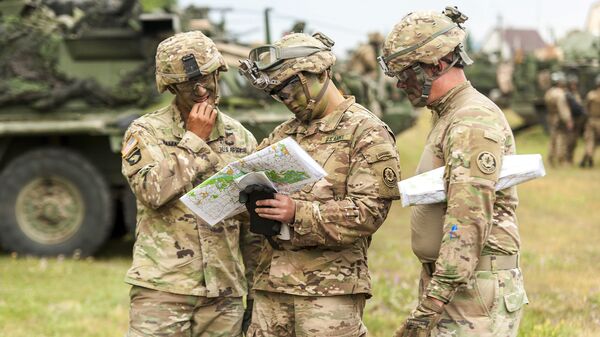The initiative is being led by Dutch Defense Minister Jeanine Hennis-Plasschaert, who in a June statement said troops and materiel must be able to "move quickly to any place where there is a threat."
NATO leaders, who have long called for their own freedom of movement in Europe, proved a highly receptive audience to the call, using the opportunity to create a sense of urgency on the issue. Constituent lobbying efforts have since been stepped up significantly, in the hope such a structure could be achieved before the end of 2017.
Outgoing @USArmyEurope commander pushes for ‘Military Schengen Zone’ by @JenJudson https://t.co/ly4n14FOrl pic.twitter.com/gDZWaTuTMK
— Jędrzej Tomczak (@JedrzejTomczak) July 30, 2017
The desperate dash for a "military Schengen zone" — so-called in reference to the 1985 agreement between 26 European states that ensures border-free travel for most Europeans — is a seemingly odd one.
Over the years, the European Union has made substantial efforts to remove internal legal hurdles to cross-border military operations. Moreover, General Curtis Scaparrotti, NATO's Supreme Allied Commander for Europe has acknowledged in the event of war, he would simply warn allies and deploy forces accordingly, without seeking approval.
What few obstacles remain, such as passport checks and customs regimes, are only ever apparent during peacetime exercises and planning, but officials claim NATO's deterrence objectives require the alliance to constantly demonstrate its capabilities outside theaters of actual conflict, so even these must be removed. In particular, chiefs have cited their annoyance at it taking five days to move US forces from Germany to Poland due to notice period requirements — in an ideal world, NATO would "move across Europe as quickly as migrants do."
Another proud class of BLC graduates ready to lead! #StrongEurope #AlliedStrong pic.twitter.com/CASdXkXjMG
— Sheryl Lyon (@CSMLyon) August 4, 2017
In essence, national governments retaining authority over their own border regulations is too much for the US-led coalition to bear. Even routine and not hugely time-consuming obligations will have to be sacrificed, in order to boost military speed and efficiency — apparently a pressing need in peacetime.
Such aspirations may fall at the first hurdle, however. For one, despite its long history of conflict, Europe's geography and infrastructure is not particularly facilitative of mass movements of troops and military equipment — many roads, bridges and rail lines are simply too weak to bear the weight, and low-ceilinged tunnels are similarly prohibitive of large vehicles.
Moreover, public opposition to the plans is likely to be high, if the plan is publicized in advance of its passing, which is not certain. The presence of US bases and missile sites not just in Europe, but the world over, has been opposed by host nations ever since their construction. The prospect of NATO troops, mainly of US origin, walking boldly and easily wherever they wish in Europe is certain to create even greater resentment.
Moreover, the contradiction at the heart of the proposal — NATO forces need wartime freedom of movement in peacetime in order to counter potential threats — is not logically resolvable, and will likely raise questions over why this need is so pressing if it purely for maneuvers and training programs, questions which may be potentially unanswerable, at least officially.
While freedom of movement for citizens is a right treasured by many Europeans, as the migrant crisis demonstrates, the public are generally largely opposed to a totally borderless world, and the retention of sovereignty over their peripheries. Imperial Germany's notorious 1914 refusal to recognize Belgium's right to forbid foreign troops from passing through its territory en route to a conflict with another country provoked such public outrage that support for the First World War rocketed skyward literally overnight.
Many, perhaps rightly, will surely associate armed troops and vehicles of war thundering through city streets with military dictatorships, or infamous foreign occupations of decades past.




